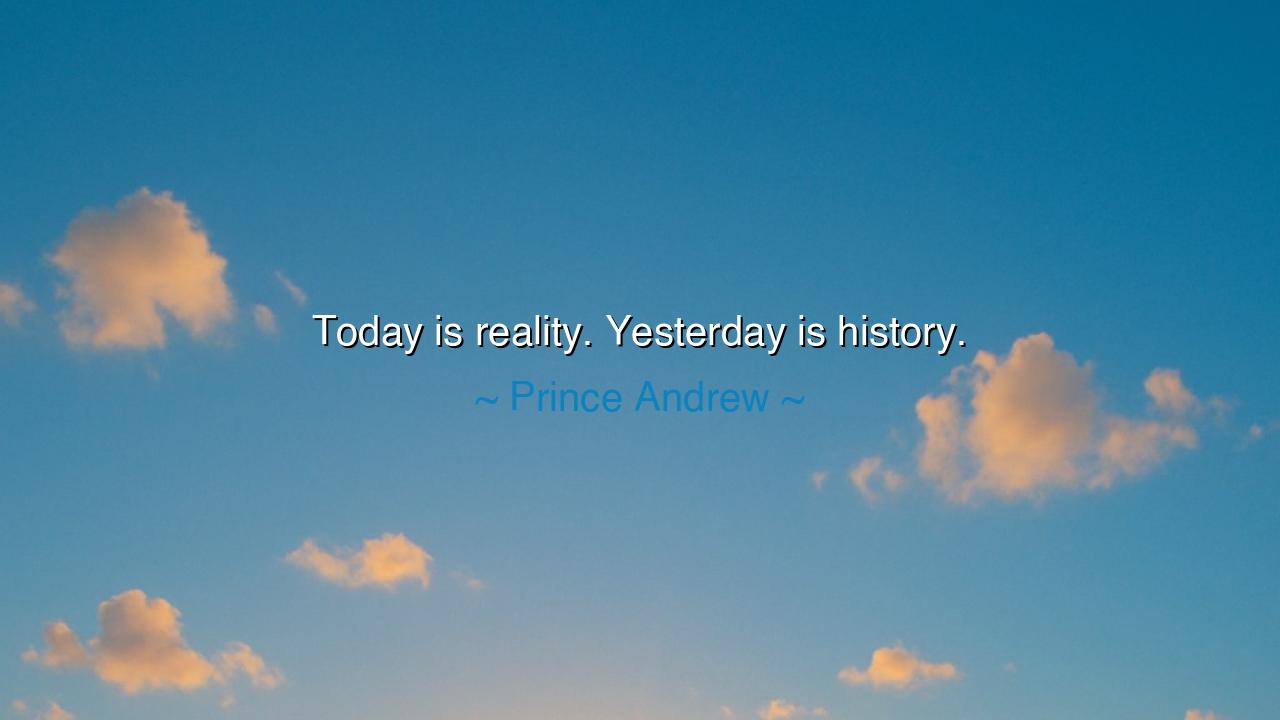
Today is reality. Yesterday is history.






“Today is reality. Yesterday is history.” – Prince Andrew
These words, spoken by Prince Andrew, are simple in form yet profound in meaning — a meditation on the nature of time, memory, and the ever-fleeting present. In them lies a truth as old as the human spirit: that the past, though rich with lessons, is beyond our grasp, while the present — the fragile moment we stand within — is the only realm where life truly unfolds. “Today is reality,” he says, reminding us that existence itself is lived not in remembrance nor in anticipation, but in this breath, this heartbeat, this instant that passes even as it is named. “Yesterday is history,” he continues — a phrase both elegiac and liberating — for it calls us to release what has been and awaken to what still may be.
From the dawn of civilization, wise men and women have wrestled with the pull of the past. The philosophers of ancient Greece spoke of chronos and kairos — time as sequence and time as opportunity — urging humankind to discern the sacred within the present. So too did the sages of the East teach that attachment to what has gone binds the spirit in chains. Yet Prince Andrew’s phrase distills these great ideas into a modern reflection, born not from the temples of thought but from the battlefield of experience. It reminds us that history, though a noble teacher, must never become a prison; and that to dwell too long in what is finished is to let reality — the only thing that can still be shaped — slip away.
Consider the tale of Japan after the Second World War. A nation reduced to ashes, its people faced the unbearable weight of defeat and loss. Many could have lived forever in sorrow for yesterday — mourning what had been destroyed. Yet their leaders and citizens turned instead to the reality of today. They rebuilt, step by step, choosing creation over despair. Within a generation, Japan rose from ruin to become one of the world’s great powers in art, technology, and innovation. Their history was not erased — it was honored — but it no longer ruled them. This is the spirit of Prince Andrew’s words: to recognize that the past cannot be relived, but from its embers the fire of the present may still be kindled.
To say “yesterday is history” is not to despise memory; it is to understand its proper place. History is the soil from which wisdom grows, yet one cannot live by burying oneself within it. Every man and woman carries a story of regret or glory — victories that cannot be repeated, mistakes that cannot be undone. If one clings to these too tightly, the eyes turn backward, and the road ahead is lost. The ancients likened such folly to Lot’s wife, who looked back upon the burning city and was turned to salt — a monument to nostalgia, unable to move forward. Thus, the teaching endures: the past must instruct, not imprison.
“Today is reality” — in those three words lies a commandment for the soul. Reality is not the dream of what might come, nor the shadow of what has gone. It is the canvas upon which destiny is painted, moment by moment. The wise live fully in this realm, knowing that the only time to act, to love, to change, to create, is now. Every sunrise is a beginning written anew; every heartbeat a chance to shape the story yet untold. To live in today is to honor the miracle of being alive — for all that has been is gone, and all that will be depends on what we choose this very day.
This wisdom is also a cure for despair. In times of hardship, the mind clings to what was lost — to the “yesterday” that seemed brighter, safer, kinder. Yet even sorrow yields to the discipline of presence. The farmer cannot lament last year’s drought if he is to plant again this spring. The artist cannot mourn the broken sculpture if his hands are to shape a new one. Life demands that we look forward with courage and work within the bounds of the possible — the eternal “now.” That is where healing happens, where creation begins again.
So take this teaching into your heart: yesterday is a teacher, but today is your life. Let memory instruct you, but let the present empower you. When you wake each morning, speak quietly to your soul: “What has passed is finished. What I have is this day.” Then live it fully — with gratitude, with courage, with purpose. For history will always remember what was, but reality belongs to those who dare to live now. In the temple of time, yesterday is carved in stone, but today is still clay in your hands — shape it wisely, and it will become tomorrow’s history worthy of remembrance.






AAdministratorAdministrator
Welcome, honored guests. Please leave a comment, we will respond soon